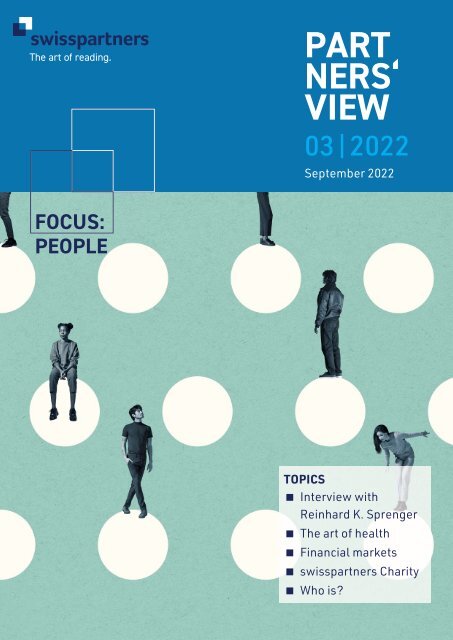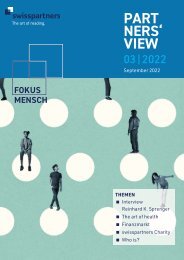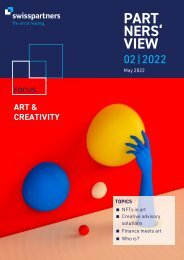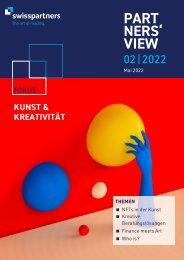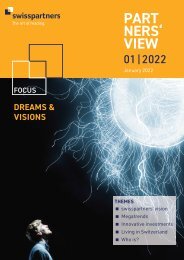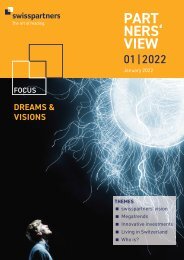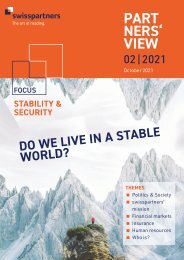Partners’ View September 2022
Issue 03 / 2022 of our magazine Partners' View on Focus: People. Request your personal copy of the print edition by sending an E-mail to: marketing@swisspartners.com
Issue 03 / 2022 of our magazine Partners' View on Focus: People. Request your personal copy of the print edition by sending an E-mail to: marketing@swisspartners.com
Create successful ePaper yourself
Turn your PDF publications into a flip-book with our unique Google optimized e-Paper software.
The art of reading.<br />
PART<br />
NERS‘<br />
VIEW<br />
03|<strong>2022</strong><br />
<strong>September</strong> <strong>2022</strong><br />
FOCUS:<br />
PEOPLE<br />
TOPICS<br />
< Interview with<br />
Reinhard K. Sprenger<br />
< The art of health<br />
< Financial markets<br />
< swisspartners Charity<br />
< Who is?<br />
PARTNERS‘ VIEW | Inhalt 1
FOCUS:<br />
PEOPLE<br />
PART<br />
NERS‘<br />
VIEW<br />
ISSUE 05
EDITORIAL<br />
A<br />
As the title “Focus: People” suggests,<br />
the <strong>September</strong> <strong>2022</strong> edition of <strong>Partners’</strong><br />
<strong>View</strong> shines a spotlight on the very<br />
thing that has motivated me in my work<br />
for swisspartners over the past 27<br />
years: people.<br />
My relationships with our customers<br />
and staff are what bring me joy.<br />
Each one of these people has a unique<br />
history – a history that is reflected in all<br />
of our conversations and encounters. It<br />
is what makes my work so exciting and<br />
fulfilling.<br />
Managing wealth and advising<br />
investors are services in which people<br />
have always been at the heart of all<br />
that we do. If there is one constant in<br />
this field, then it is the fact that the<br />
focus will, with certainty, always<br />
remain on the individual – even in the<br />
future.<br />
The financial industry can be as<br />
innovative as it likes – developing<br />
new products, digital customer portals<br />
and automated investment processes –<br />
but there is nothing that can replace<br />
personal consultations, from one<br />
human to another. That’s the only<br />
way for us to gain insight into our<br />
customers’ minds, their hopes and<br />
their worries.<br />
For management author and leadership<br />
expert Reinhard K. Sprenger, too, it is<br />
people that make all the difference. In<br />
our exclusive interview, he discusses<br />
the ideological return to the three Cs:<br />
“customers”, “collaboration” and<br />
“creativity”.<br />
Christian Dietsche, CEO Wealth<br />
Management, always keeps people’s<br />
needs in mind. We’ve interviewed him<br />
for our WHO IS column this time<br />
around.<br />
To be able to focus on the well-being of<br />
our customers day in and day out, our<br />
employees need to stay mentally and<br />
physically fit. Vanessa Burkart and<br />
Pascal Schmohl show us that corporate<br />
health management can be fun.<br />
swisspartners’ work with various<br />
charity projects – such as building<br />
a better life for the people of<br />
Muntigunung in Bali – is another source<br />
of joy.<br />
What else will this year bring? “The<br />
only constant is change”, says Peter<br />
Ahluwalia, Chief Investment Officer, as<br />
he takes a look at future developments<br />
in the financial markets.<br />
With that in mind: stay agile and happy<br />
reading!<br />
Yours<br />
Markus Wintsch<br />
CEO swisspartners Group<br />
PARTNERS‘ VIEW | Editorial 3
CONTENTS<br />
4 Contents | PARTNERS‘ VIEW
REINTRODUCING THE<br />
HUMAN BEING 6<br />
Interview with Reinhard K. Sprenger<br />
WITHOUT HEALTH,<br />
NOTHING ELSE MATTERS 12<br />
The art of health – workplace health management<br />
at swisspartners<br />
THE ANSWER IS BLOWING<br />
IN THE WIND 14<br />
Financial market analysis by Peter Ahluwalia<br />
A HELPING HAND FOR<br />
PEOPLE, ANIMALS AND<br />
THE ENVIRONMENT 16<br />
swisspartners Charity<br />
WHO IS? 22<br />
Profile: Christian Dietsche<br />
PUBLISHING INFORMATION 23<br />
PARTNERS‘ VIEW | Contents 5
REINTRODUCING<br />
THE<br />
HUMAN BEING<br />
MANAGEMENTAUTOR AUTHOR UND AND<br />
FÜHRUNGSEXPERTE<br />
LEADERSHIP DR. REINHARD K. SPRENGER<br />
ÜBER<br />
FÜHRUNG DISCUSSES IN LEADERSHIP DIGITALEN ZEITEN,<br />
SELBSTVERANTWORTLICHES<br />
IN A DIGITAL ERA, ACTING<br />
HANDELN RESPONSIBLY, UND AND DIE BELEBENDE THE<br />
KRAFT INVIGORATING VON KONFLIKTEN. POWER OF<br />
Das CONFLICTS. Interview führte Kathrin Meister.<br />
Interview by Kathrin Meister.<br />
Photo © Robin Sprenger<br />
Mr Sprenger, you really are a man of many talents: the most<br />
popular business writer in Germany, a successful management<br />
consultant and leadership expert, speaker, coach, philosopher<br />
and musician. How do you fit it all in?<br />
It's actually not that difficult. Many of the things you’ve<br />
mentioned are related, after all. Aside from that, I’m what you’d<br />
call a “happy workaholic”. Many years ago, I decided to focus<br />
on the things that I really want to do, with little compromise. It<br />
means that I do whatever my energy is naturally channelled<br />
towards, things that feel exciting, new ideas and such like. The<br />
translation of the Christian “Lord’s Prayer” that talks about God<br />
giving us our daily bread is far too narrow an interpretation. It<br />
isn’t really talking about bread from the baker – it’s about a<br />
daily dose of inspiration and personal expansion. When I live<br />
like that, I don’t watch the clock, and I don’t fantasise about alternatives.<br />
Someone sitting at their desk dreaming about<br />
Hawaii is neither at their desk, nor in Hawaii.<br />
6 Lead Article Focus: People | PARTNERS‘ VIEW
But some things must still get short-changed, don’t they?<br />
Of course. Whenever you say yes to something, you are saying<br />
no to something else. Sometimes it can have a negative impact<br />
on a friendship, or hobbies, or my family. But I accept that,<br />
because you really can’t have everything, and some things are<br />
more important to me than others. That is why the idea of a<br />
balanced lifestyle is unrealistic – even though many people<br />
dream about it. Our lives are always unbalanced. Balancing is<br />
necessary but balance itself is an illusion.<br />
The Financial Times once described you as “the manage ment<br />
philosopher with the sharpest tongue”. Your often revolutionary<br />
theses are based on a very libertarian view of humanity.<br />
What are the cornerstone characteristics of this “fundamental<br />
humanism”, as you call it?<br />
Anyone who considers the things I say and write to be<br />
revolutionary is making more of a statement about themselves<br />
than about me. That label really goes to show how extreme the<br />
collective illusion has become at this point. There is hardly any<br />
area of business management that doesn’t have foregone conclusions<br />
about what can be said and what must be done. That<br />
hypnosis mostly relates to beliefs about humanity; it is based<br />
on certain fundamental anthropological premises. Businesses<br />
are not prepared to view their employees as free beings. They<br />
don’t see them as adults who can take personal responsibility,<br />
but rather as children who need to be raised, guided, motivated,<br />
and even provided with therapy. By the way, that’s true to the<br />
exact extent that they claim the opposite to be true. Sometimes<br />
this stance is also the result of the latest management<br />
gimmicks; sometimes it is due to a lack of thought or clarity.<br />
But it has consequences. Unclear thinking leads to unclear<br />
speech, which in turn leads to unclear action.<br />
What are the benefits of acting responsibly, and how can<br />
people learn to do so?<br />
Businesses can no longer outperform the competition with a<br />
corporate culture of “yes-men”, simply following the herd or<br />
“top-down management”. That’s why we need to encourage<br />
more individual initiative and entrepreneurial spirit throughout<br />
the entire company. This also benefits the individual. I am<br />
convinced that the ability to act responsibly is the best skill<br />
that can be shared in the world. Everyone has a real chance to<br />
assume personal responsibility, to treat themselves with<br />
respect, to be committed and to fulfil their own potential as a<br />
means of actualising their freedom. We must create conditions<br />
in which this potential can be fully realised.<br />
„ Someone sitting at their<br />
desk dreaming about Hawaii<br />
is neither at their desk, nor<br />
in Hawaii.”<br />
Which specific conditions are you thinking of there?<br />
First of all, insight – insight into the benefits of thinking and<br />
acting in an entrepreneurial way, especially in the peripheral<br />
parts of the company. And then necessity – that is, economic<br />
necessity. There must be an urgent need to “emerge” from the<br />
old way of doing things. Lofty goals won’t be enough. Thirdly,<br />
decluttering rather than repairing! In management, new things<br />
are always being added to the pile. It’s rare for someone to say:<br />
“We won’t do that anymore.” But you have to give one thing up<br />
in order to start doing something else. You need to stop doing<br />
things that have become part of a stale routine over the last<br />
several decades. Inflexible targets, for example, or endless<br />
planning rituals. Moving things aside that are just there to<br />
distract us from our customers allows us to breathe more<br />
easily again.<br />
In your book “Radikal digital” (Radically Digital), you somewhat<br />
provocatively call for the “reintroduction of the human being”<br />
in business as a response to digitalisation. What exactly does<br />
that mean?<br />
Digitalisation is only a technological revolution at the surface<br />
level. In reality, it is a social upheaval. The more digital<br />
companies become, the more important people become. It<br />
sounds like a paradox, but it isn’t at all. At its core, digitalisation<br />
doesn’t mean a technological revolution, especially not the<br />
“might of the machine” or the “authority of the algorithm”. It<br />
means focusing on the essential things that only human beings<br />
can do. In this sense, the digital transformation is not in its<br />
essence a purely technological revolution. It is a cultural<br />
revolution. And it involves crucial processes in companies, for<br />
example shifting from “me” to “we”, from “avoiding mistakes”<br />
to “trying it out” and from “motivating” to “motivation”.<br />
The more digital companies<br />
become, the more important<br />
„people become.”<br />
PARTNERS‘ VIEW | Lead Article Focus: People 7
Photo © Robin Sprenger<br />
It is ideas that will<br />
determine who wins the<br />
„battle for the future.”<br />
You define employee motivation as an “activated willingness<br />
to perform”. How can a company best encourage this willingness<br />
to perform in its employees?<br />
To put it into a simple formula, I would say: (1) Find the right<br />
people, (2) challenge them, (3) talk with them frequently,<br />
(4) trust them, (5) pay them well and fairly and (6) get out of<br />
the way.<br />
You say that an ideological return to the three factors of<br />
“customers”, “collaboration” and “creativity” has the power to<br />
radically transform businesses. Can you give us a little insight<br />
into your thesis?<br />
The Cs you mention used to be part of business, but the<br />
modern organisational process has crowded them out. Once<br />
upon a time, customers were the driving force behind the<br />
business. Then companies grew larger, and focused more and<br />
more on themselves. The decades of appeals for companies to<br />
be more “customer oriented” are proof of that. But now, the<br />
time has once again come to consider the entire company<br />
from the customer’s perspective. To enter into co-evolution<br />
with the customer. To stop thinking about the company from<br />
the inside out, and start thinking about it from the outside in.<br />
The organisational process has also weakened collaboration<br />
within the company – in favour of specialisation, expertise and<br />
coordination. Managers divided up tasks and then pieced<br />
them back together again. But now digitalisation demands<br />
entirely new forms of collaboration between employees –<br />
across hierarchies, across business functions, across departments.<br />
Even across companies. That’s why it is important not<br />
to think of companies as an arena for coordination, but to<br />
think of them – once again, and more than ever – as an arena<br />
for collaboration. Collaboration must be prioritised at all<br />
levels. And this also includes the awkward conversations<br />
about working from home.<br />
That still leaves creativity.<br />
Creativity has been the greatest victim of the efficiency<br />
paradigm. It became more and more alien to businesses,<br />
which is why it was then outsourced to special institutions,<br />
like universities, laboratories and start-ups. But businesses<br />
can't afford to do that anymore. It is ideas that will determine<br />
who wins in the battle for the future – because technology<br />
cannot create ideas. Ideas create technology.<br />
Would you like to elaborate on that last point?<br />
As I see it, the only legitimate goal of management is for<br />
people to manage themselves. Wouldn’t it be a good thing if<br />
employees didn't just use their hands to help the company<br />
survive, but their heads and hearts too? Wouldn’t it be<br />
wonderful if employees worried about the fate of the company<br />
as a whole, and not just about their own job or their next<br />
promotion? If they sought to improve business processes that<br />
don't even fall within their own remit? If they could drive<br />
innovation without waiting for instructions? Wouldn’t it be<br />
amazing to know that all the employees are with your<br />
customers – and not at the head office? Wouldn’t it be helpful<br />
to have experts who take responsibility for themselves, who<br />
develop new ideas and who coordinate and integrate their<br />
activities? In short: wouldn’t it be fantastic if you didn't have to<br />
pay for management? Of course that sounds illusory right<br />
now. But if companies took just a few steps in that direction,<br />
they wouldn’t need to worry about employee motivation or the<br />
company’s future viability. The real purpose of management<br />
is less about teaching and much more about raising people<br />
up. About encouraging others to reach their full potential. At<br />
some point in our lives, we all need someone to say: “I believe<br />
in you!”<br />
„ The real purpose of<br />
management is to<br />
encourage others to<br />
reach their full potential.”<br />
8 Lead Article Focus: People | PARTNERS‘ VIEW
Conflicts are the lifeblood of<br />
a team that will stand the test<br />
„of time.”<br />
Your last book is titled “Magie des Konflikts” (The Magic of<br />
Conflict). In it you suggest that we should “replace ‘conflict<br />
resolution’ with ‘conflict as a solution’”. How can the magical<br />
power of conflict be used constructively – in the workplace and<br />
in our private lives?<br />
We owe all of our abilities and all of our skills to situations<br />
that pushed us to our limits – that is, obstacles and problems.<br />
They challenge us and allow us to grow. It starts in childhood.<br />
A strong sense of self, for example, can only develop through<br />
conflict – i.e., becoming independent from our parents. This<br />
harnesses power – power that we need to grow. Conflict is<br />
also decisive in romantic relationships; in the same way that<br />
architecture is not defined by the spaces, but rather by the<br />
edges, corners and transitions. Relationships are strengthened<br />
by conflict, and conflict has a stabilising effect on the rules of<br />
partnerships. Those who have never experienced or had to<br />
overcome a conflict in their relationship will remain susceptible<br />
to shocks and uncertainties. Smooth-running daily<br />
routines aren’t the proving grounds for “perfect couples” –<br />
disputes are. After a dispute is when they know: we got<br />
through that together and were able to look each other in the<br />
eye again at the end of it.<br />
But in business, people tend to avoid conflict. You want<br />
everyone to pull together.<br />
If you view conflict within the company as a catalyst for<br />
develop ment and growth then you are pulling together.<br />
Conflicts are an impetus for change. They are like a flashing<br />
warning light: something needs to happen here! This is especially<br />
important for the future viability of the company. Only conflict<br />
can release us from the shackles of past success. We all know<br />
that success gives us a kind of “learning disability". Every innovation,<br />
every moment of progress is the result of a conflict. Or,<br />
let’s take collaboration within the company as an example.<br />
Conflict makes collaboration smarter and gives it greater<br />
substance. Conflicts reveal the true complexity of situations,<br />
which would otherwise go unnoticed. This happens when we<br />
see the world from another person's point of view; when we<br />
are truly interested. Conflict lets us find out what the other<br />
person really wants. I will never learn more about another<br />
person and what is important to him than when he starts an<br />
argument for that reason! So conflicts are productive in the<br />
best sense of the word. For a company, they are like rain for<br />
the fields – they are the lifeblood of a team that will stand the<br />
test of time.<br />
While we’re talking about conflicts: what really makes you<br />
mad?<br />
I don’t have to think about that one very long. The fact that<br />
moralising supersedes all other values. That no society in<br />
history has ever lived with such a highly developed sense of<br />
guilt. That dim-witted social therapists constantly attack<br />
every hint of individuality, demanding “You must change your<br />
life!” That tiny minority groups are destroying our everyday<br />
language. That some cliques of activists have successfully<br />
shaken justice to its foundations through forced, morally<br />
based rule-breaking. That an entire society has been<br />
kidnapped and dragged around by its guilty conscience like a<br />
bull by its nose ring.<br />
You are considered one of the most important economic<br />
visionaries and Germany’s most prominent management<br />
consultant. Does that ever put you under pressure?<br />
No. It has not and it does not. And anyway, I’m just riding<br />
along slowly into the sunset. Before long, the time will come<br />
when you will forget everything and everyone will forget you.<br />
Besides, drawing constant comparisons is bad for the soul.<br />
And for financial success. I was never really interested in my<br />
competition, I just wanted to forge my own path. Jeff Bezos<br />
once said that we shouldn’t obsess about the competition, but<br />
rather focus on the customer. Because your competition<br />
doesn’t give you money – the customer does.<br />
What motivates Reinhard Sprenger, the human being, in these<br />
times of enormous global challenges?<br />
The thing you actually left out in the “fit it all in” question at<br />
the beginning: my children. I would like to be optimistic about<br />
their futures but, unfortunately, I’m not. I see that democracy,<br />
above all, is on the retreat around the world, and that we are<br />
naively squandering our freedom. Our emotional freedom, as<br />
well. To me, stopping this development is “time well wasted”.<br />
In this interview with Reinhard Sprenger we have used “he/him” as the default<br />
pronouns at his request. It goes without saying that all genders are intended equally.<br />
PARTNERS‘ VIEW | Lead Article Focus: People 9
BECAUSE PEOPLE MAKE<br />
ALL THE DIFFERENCE<br />
EXCERPTS FROM THE BOOK<br />
“RADIKAL DIGITAL – 111 FÜHRUNGSREZEPTE”<br />
(Radically Digital – 111 Recipes for Leadership)<br />
BY REINHARD K. SPRENGER<br />
RADICALLY DIGITAL<br />
Because people make all the difference –<br />
111 recipes for leadership<br />
ISBN: 978-3-421-04809-7 (German)<br />
The company as a well-oiled machine – this concept has dominated the world of<br />
business management for a long time. Anything that seemed unnecessary was<br />
sacrificed for the sake of efficiency. Particularly the human being. People were seen<br />
as a stopgap solution for the tasks that machines couldn’t handle. In this sense, they<br />
were just tolerated: they were expected to work, not think, and their individuality<br />
got in the way. Paradoxically, technological developments are precisely what is<br />
forcing the reintegration of the human being into the value creation process.<br />
Digitalisation has had an unexpected side-effect: human abilities are being<br />
re-evaluated and viewed with a new appreciation. There is now a real opportunity<br />
for them to be realised. Because the market demands them. And technology is<br />
paving the way for them. (...)<br />
THE MAGIC OF CONFLICT<br />
Why we all need it and how it<br />
drives us forward<br />
ISBN: 978-3-421-04854-7 (German)<br />
If you want to create a truly comprehensive plan for digital transformation, the<br />
human being is the only “computer” that can do it. A computer that is simple and yet<br />
complex. An incomputable computer that, as a result, is able to observe customer<br />
desires, technological change and the global markets – every single day, all at once,<br />
with all their mutual dependencies. The human being, who interacts with the<br />
company at each different touch point. Outside of the organisation, as a customer<br />
whose individuality is constantly increasing, who wants everything to be easier,<br />
faster and more convenient. Internally, as an employee who is forced to work<br />
together with colleagues – whose existence he was unaware of until now. And<br />
someone who must now rediscover his long-buried creative potential. It’s no<br />
coincidence that the “unicorns” in Silicon Valley were the staunchest protesters<br />
Only people can turn<br />
the old world of economics<br />
„upside down.”<br />
10 Book Excerpts “Radikal Digital” | PARTNERS‘ VIEW
„ Digitalisation has had an<br />
unexpected side-effect: human<br />
abilities are being re-evaluated<br />
and viewed with a new<br />
appreciation.”<br />
Photo © Robin Sprenger<br />
against Trump’s plans to limit the immigration of even<br />
qualified migrants. These companies know that the most<br />
important thing driving them forward is not technology, but<br />
people. In their eyes, only people can turn the old world of<br />
economics upside down. (...)<br />
Although you might find the thought surprising, digitalisation<br />
is an ideological homecoming, as far as humanity is<br />
concerned. If you look closely, you’ll see terms that we have<br />
been discussing for years: personal responsibility, selfmotivation,<br />
trust. Because digital technology is the great<br />
equaliser, but people are what make all the difference. Smart<br />
machines can be copied quickly enough. But that isn’t true of<br />
humans. (...) As a manager in the digital era, you are<br />
confronted with a challenge that has much less to do with<br />
technology than it does with people. A cultural transformation<br />
is needed in business.<br />
Accordingly, the defining moment for a company comes when<br />
it understands that digital transformation is not a question<br />
of technology, but of culture. At its core, it is a social<br />
transformation – for the individual employee and for the organisational<br />
structures.<br />
Unclear thinking leads to<br />
unclear speech, which in turn<br />
„leads to unclear action.”<br />
ABOUT<br />
Reinhard K. Sprenger, born in 1953 in Essen, studied<br />
history, philosophy, psychology, business administration<br />
and sports in Bochum. As Germany’s most prominent<br />
management consultant and one of the most important<br />
visionaries in the field of economics, Reinhard K. Sprenger<br />
serves as a consultant to all of the important DAX-100<br />
companies. His books have all become bestsellers, have<br />
been translated into multiple languages and have<br />
changed corporate reality from the ground up over the<br />
past 30 years. His most recent books, “Radikal digital”<br />
(Radically Digital) (2018) and “Magie des Konflikts” (The<br />
Magic of Conflict) (2020) were published by DVA<br />
(Deutsche Verlags-Anstalt). He has also released three<br />
albums as a rock musician in his spare time. Reinhard K.<br />
Sprenger lives in Winterthur, Switzerland and Santa Fe,<br />
New Mexico.<br />
PARTNERS‘ VIEW | Book Excerpts “Radikal Digital” 11
THE<br />
ART<br />
OF<br />
HEALTH<br />
BECAUSE<br />
WITHOUT HEALTH,<br />
NOTHING ELSE<br />
MATTERS<br />
BY VANESSA BURKART<br />
AND PASCAL SCHMOHL<br />
It is only possible to consistently focus our daily work on our<br />
customers’ well-being when we work in an environment<br />
shaped by team spirit, dedication and mutual appreciation. As<br />
a small, globally active company, we maintain a close-knit<br />
corporate culture that is based on a sense of teamwork. And<br />
workplace health management is an increasingly important<br />
part of this culture. We deeply value those resources that are<br />
absolutely irreplaceable – the people at swisspartners, and<br />
their physical and mental well-being.<br />
When we pay more attention to our health, we are better able<br />
to cope with stress, crises, and exceptional challenges. It<br />
helps us to develop a steadfast resilience. That’s why, a few<br />
years ago, we carried out an internal study to evaluate the<br />
current situation and the needs of our staff as far as<br />
workplace health management goes. As a result, a few<br />
important topics emerged for us: exercise, nutrition, stress<br />
management, relaxation techniques and mental health. This<br />
study served as the spark behind our current workplace<br />
health management programme “The art of health”.<br />
PIMP YOUR HEALTH: PROMOTING EMPLOYEE HEALTH AT<br />
SWISSPARTNERS<br />
We spend two-thirds of our waking hours at work. So a good<br />
working environment is essential, as it is giving people<br />
enough freedom to look after their own health. Over the years,<br />
we have developed numerous ideas for health management<br />
and implemented them with great enthusiasm.<br />
▪ Participation in the Zurich marathon as a swisspartners<br />
team<br />
▪ Lunch walks: monthly lunchtime walks through Zurich.<br />
After walking for an hour, we enjoy a healthy shared lunch<br />
with superfood-to-go<br />
▪ Fruit baskets and booster drinks in the office on a regular<br />
basis<br />
▪ Mindfulness cards for all employees, for a little break<br />
during their day<br />
▪ Training about topics like nutrition, resilience and stress<br />
management/relaxation techniques<br />
▪ A day-long “Racketlon” with table tennis, badminton,<br />
squash and tennis for anyone who wants to get involved<br />
▪ Enough free time during lunch breaks for activities like<br />
jogging or yoga – showers are available<br />
▪ Nuts and healthy juices to everyone working from home<br />
▪ Table tennis tournament as part of charity events<br />
▪ Team ski weekends in the winter months<br />
▪ Discounted gym memberships for all employees<br />
▪ Ergonomics in the workplace: after the renovations, the<br />
new office will feature height-adjustable desks<br />
▪ Wall gardens and plenty of plants for a relaxing, healthy<br />
work environment in the new office<br />
12 The art of health | PARTNERS‘ VIEW
INTO THE FUTURE<br />
Covid and the increased numbers of people working from<br />
home changed the world of work for us as well. On the one<br />
hand, working from home has given people more time to take<br />
a quick walk or get some exercise during their lunch break.<br />
On the other hand, there’s a danger of not being able to switch<br />
off. Our employees miss the chance to discuss things with<br />
their colleagues – and the swisspartners team spirit we’ve<br />
mentioned so often. Not all the activities we discussed previously<br />
were possible during the pandemic. And the renovations to<br />
our offices have meant that many employees seldom have the<br />
chance to see each other, which makes it difficult to do things<br />
together.<br />
„ When we pay more attention<br />
to our health, we are better<br />
able to cope with stress and<br />
crises.” Vanessa Burkart<br />
THE ART OF HEALTH –<br />
OUR TEAM<br />
But, for the future, one thing is certain: We want to support<br />
our employees – who have a wide age span from their midtwenties<br />
to their mid-seventies – in their health and well-being<br />
as much as possible. And to do that, we plan to relaunch the<br />
existing health programmes and to create new ones. We want<br />
to design working life at swisspartners so that individuals,<br />
and their aptitude for change, are more at the heart of things<br />
than ever before – so we can reach our shared goals as a<br />
company.<br />
WORKPLACE HEALTH MANAGEMENT WITH FIVE VALUES<br />
Vanessa Burkart | Partner<br />
Head Human Resources<br />
vanessa.burkart@swisspartners.com<br />
RESPECT<br />
We treat others with respect and appreciation.<br />
TRUST<br />
We support our clients and staff as trustworthy partners.<br />
INDIVIDUALITY<br />
We support every one of our employees and their individuality.<br />
PERFORMANCE<br />
We live and breathe team spirit and pursue our goals –<br />
dynamically and consistently.<br />
INNOVATION<br />
We think innovatively, make the most of opportunities<br />
and strive for continuous development.<br />
Pascal Schmohl | Member of the<br />
Management | Partner<br />
Compliance Officer<br />
Wealth Management<br />
pascal.schmohl@swisspartners.com<br />
PARTNERS‘ VIEW | The art of health 13
“To buy when others are<br />
despondently selling and<br />
to sell when others are<br />
greedily buying requires<br />
the greatest fortitude and<br />
pays the greatest reward.”<br />
Sir John Templeton<br />
THE ANSWER, MY<br />
FRIEND, IS BLOWIN’<br />
IN THE WIND<br />
BOB DYLAN<br />
FINANCIAL MARKETS ANALYSIS<br />
BY PETER AHLUWALIA<br />
WWhilst<br />
the much-expected “excitement” finally arrived to<br />
markets, it was not the kind most investors would call “fun”.<br />
The signs had all been pointing to a downturn: the Crypto<br />
bubble was nearing its bursting point. The continuous rise in<br />
housing prices and certain stocks was unsustainable. And<br />
bond yields were long-overdue for an increase after decades<br />
of decline.<br />
With so many economic cross-currents at the moment, calling<br />
the current outlook “murky” would be an understatement.<br />
Investors are still fluctuating between gambling on inflation<br />
and recession like lovesick teenagers …<br />
Since the financial industry is not much better at forecasting<br />
than a daisy is at predicting true love, we should shift our<br />
focus. Rather than predicting the future, we should figure out<br />
the definites and identify productive courses of action.<br />
THE ONLY CONSTANT IS CHANGE<br />
Every bear market is followed by a bull market, without<br />
exception. We never know how long it will last, but we can<br />
make an educated guess. I believe this one will be longer than<br />
the covid downturn, because governments and central banks<br />
cannot flood the economies with free money this time. That<br />
free money is, after all, the main reason for the inflation we<br />
are seeing now.<br />
However, this recession/slowdown is caused by the central<br />
banks, which means they can back off when the timing is<br />
14 Financial markets | PARTNERS‘ VIEW
ight. Don’t get me wrong – I’m not talking about rate cuts!<br />
That would prove that they are no better at steering<br />
economies than drunken sailors (no offence intended to<br />
drunks or sailors). But the tightening cycle could pause<br />
earlier than expected, which would bring us some relief. I<br />
expect this recession to be shallow and short-lived; we may<br />
be able to get on with the economic recovery later in the year.<br />
WHAT TO DO IN THE CURRENT MARKET?<br />
For a well-prepared investor, a bear market is an opportunity,<br />
as they don’t come along too often. Historically, the market<br />
has spent more years in a bull market than a bear market.<br />
Whilst no one can consistently predict the duration or<br />
magnitude of bear markets at the company level, a good<br />
investment manager should be able to pick up some bargains<br />
for the not too distant future. But don’t pick up high-flying<br />
stocks just because they are cheaper. Instead, pay attention to<br />
fundamental financial metrics and understand the business<br />
you are investing in.<br />
It is highly unlikely that you will get the bottom price for most<br />
stocks, so you have to be prepared for some short-term pain.<br />
However, the rewards on the other side will be significant.<br />
Often, the only reason stocks fall is because people are<br />
selling, which convinces others to sell.<br />
Essentially, you need to invest like a psychopath! That’s not to<br />
say that you should be morally depraved, of course, but when<br />
it comes to investing, you must stay unemotional and have<br />
blatant disregard for what others think.<br />
MY BEST GUESS<br />
Most of the declines (or at least 75% of them) in equity indices<br />
have already occurred. As economic growth stays resilient<br />
and actually picks up, moderating inflation, less hawkish<br />
central banks and consumers (who are nervous but still in<br />
fairly good shape) will narrow the losses at the index levels.<br />
On a global basis, housing is likely to remain challenged,<br />
especially outside of the USA, where prices have not adjusted<br />
yet. The combination of higher rates and overvaluation will<br />
probably lead to a correction of 20% or so, but not a 2008<br />
scenario.<br />
2023 is the year we enter a new bull market, making up all the<br />
losses and seeing some gains as well. Investors are likely to<br />
be wary, so it might take time for things to heat up.<br />
2023 is also an uneven year – haven’t you noticed the recent<br />
trend? 2017 great, 2018 challenging, 2019 great, 2020<br />
challenging, 2021 great, <strong>2022</strong> – well you know …<br />
„<br />
PETER AHLUWALIA | PARTNER<br />
Chief Investment Officer<br />
peter.ahluwalia@swisspartners.com<br />
Investors are still fluctuating<br />
between gambling on inflation<br />
and recession like lovesick<br />
teenagers.”<br />
Peter Ahluwalia<br />
PARTNERS‘ VIEW | Financial markets 15
Photo © Marco Gaiotti<br />
A HELPING<br />
HAND FOR<br />
PEOPLE,<br />
ANIMALS<br />
AND THE<br />
ENVIRONMENT
SIMONE TÖLLNER, PRESIDENT OF SWISSPARTNERS CHARITY,<br />
TALKS ABOUT THE ASSOCIATION’S WORK WITH CHARITABLE<br />
ORGANISATIONS.<br />
Do good and spread the word ... You may know swisspartners as a renowned<br />
financial services provider with Swiss roots, but did you also know about our<br />
charity work? For over 13 years, we have been supporting projects and non-profit<br />
organisations both domestically and abroad with our independent association<br />
“swisspartners Charity”. Our work focuses on humanitarian aid, environmental<br />
protection and animal welfare.<br />
I have been the new president of the swisspartners Charity since May of this year<br />
and I am really excited to be working with a highly motivated team to support five<br />
important projects, each of which has a connection to Switzerland.<br />
1. Since 2016, we have been sponsoring ONG Bouge – an organisation based in<br />
Bénin, West Africa, which was founded in 2007 by Swiss-born Irmgard Meier.<br />
The donations are used to expand the availability of apprenticeships in Bénin<br />
and to purchase school books for orphans.<br />
2. We have also been supporting the Future for Children organisation since 2016.<br />
Its mission is to help disadvantaged people in Bali, Indonesia. Founder Daniel<br />
Elber visited us in Switzerland this July and gives us an update about his work<br />
and the current situation in Bali on pages 20 and 21.<br />
3. swisspartners also has a big heart for animals. Since 2019, we have been<br />
supporting two organisations in this area: Four Paws Switzerland and BOS<br />
Switzerland (Borneo Orangutan Survival Switzerland). Four Paws (which has<br />
branches in 15 different countries) is one of the world’s most important animal<br />
welfare organisations. In Switzerland, the organisation’s work revolves around<br />
the humane and appropriate treatment of pets and stray dogs and cats, as well<br />
as wild animals in captivity.<br />
4. Since it was founded in 2004, BOS Switzerland has been committed to protecting<br />
the remaining orangutans in Borneo and preserving their habitat, the rainforest,<br />
which is under severe threat.<br />
5. People with physical disabilities have as much right to a free and self-determined<br />
life as anyone. The Zurich-based organisation Leben wie du und ich (Living like<br />
you and me) makes this possible. It helps people to live in their own apartments,<br />
work creatively and realise their dreams – and is also supported by swisspartners<br />
Charity.<br />
„ If you want to<br />
make a small<br />
contribution that<br />
will have a big<br />
impact, you can<br />
become a member<br />
too!”<br />
Our management board and the organisation are made up entirely of swisspartners<br />
Group employees – all working on a voluntary basis. And here’s the good news: if<br />
you want to make a small contribution that will have a big impact, you can become<br />
a member too! Membership starts at just 100 CHF per year. All membership fees<br />
are used entirely to support our projects.<br />
Get in touch:<br />
SIMONE TÖLLNER<br />
President swisspartners Charity<br />
charity@swisspartners.com<br />
PARTNERS‘ VIEW | swisspartners Charity 17
FIVE PROJECTS,<br />
ONE GOAL<br />
TO MAKE THE<br />
WORLD A BETTER<br />
PLACE<br />
ONG BOUGE<br />
FOUR PAWS SWITZERLAND & BOS SWITZERLAND
BORNEO ORANGUTANS<br />
LIVING LIKE YOU AND ME<br />
FUTURE FOR CHILDREN<br />
Photo © Tim Flach
HELPING PEOPLE<br />
HELP THEMSELVES<br />
IN MUNTIGUNUNG,<br />
NORTHERN BALI<br />
A REPORT BY DANIEL ELBER, FOUNDER OF THE<br />
ORGANISATION “FUTURE FOR CHILDREN”<br />
20 Inhalt | PARTNERS‘ VIEW<br />
Photo © Heinz von Holzen
„ Both malnutrition and the<br />
high child mortality rate have<br />
been practically eliminated.”<br />
FFuture for Children was founded in 2004 with the aim of<br />
fighting the poverty experienced by the 6,000 inhabitants of<br />
Muntigunung in northern Bali, and building a better future for<br />
the children there.<br />
The Muntigunung region is extremely dry. Hardly any rain<br />
falls between May and December, and there are no natural<br />
sources of water. To get the water they need to survive, the<br />
residents have to spend up to five hours each day collecting<br />
water from Lake Batur or from the northern coast. This work<br />
is mainly done by women and children. The children don’t<br />
have time to go to school, and the families live without any<br />
regular income. Most of the beggars in Bali come from<br />
Muntigunung.<br />
The Future for Children organisation is actively working<br />
towards four goals: To build a water-supply infrastructure to<br />
help the inhabitants win back time for productive activities. To<br />
create the conditions required for sustainable, paid work in<br />
“social enterprises” in the future through adult training<br />
programmes. Our goal with this step is to ensure that, with<br />
their improved financial foundation, the families will be able to<br />
send their children to school in the future. Aside from that,<br />
improving hygiene and health education will significantly<br />
reduce malnutrition and child mortality in the region. These<br />
four measures create a foundation that helps the inhabitants<br />
to help themselves.<br />
Thanks to the close cooperation with swisspartners Charity<br />
since 2016, Future for Children has been able to supply 35<br />
villages with water and to significantly improve the health of<br />
the local population. Both malnutrition and the high child<br />
mortality rate have been practically eliminated.<br />
In addition, we have three social enterprises that employ<br />
around 200 inhabitants – they have all received intensive<br />
training and gained the skills required to create high-quality<br />
products. Furthermore, nearly 700 farmers supply the raw<br />
materials that these small factories use to produce cashew<br />
nuts, rosella tea, brown palm sugar and other food products.<br />
Trekking tours led by former beggars bring guests over the<br />
mountains to Muntigunung. By having tourists visit the villages,<br />
we are creating a connection between the local population<br />
and the outside world, while allowing interested visitors to<br />
share in the positive developments that have been achieved<br />
so far.<br />
We have built a foundation that will allow us to create even<br />
more jobs in the years to come, as well as to ensure that all<br />
children can overcome the challenges and graduate from<br />
school.<br />
The cooperation with swisspartners Charity is based on a<br />
shared long-term vision. This makes planning and carrying<br />
out sustainable activities so much easier for us as an<br />
organisation. We stay in touch and keep each other up to date<br />
about the results of our shared activities. For us, it’s been a<br />
perfect example of a positive collaboration!<br />
DANIEL ELBER Founder of the organisation “Future for Children”<br />
info@zukunft-fuer-kinder.ch<br />
THE SWISSPARTNERS CHARITY TEAM (from left to right)<br />
Marco Di Canio, Andrea Stalder, Caroline Fiala, Nick Jenni,<br />
Daniel Elber, Simon Knörzer, Simone Töllner, Sanjeev Premchand<br />
PARTNERS‘ VIEW | swisspartners Charity 21
WHO IS?<br />
A COMPANY IS ONLY AS GOOD AS ITS EMPLOYEES.<br />
IN THIS COLUMN, WE PRESENT TALENTED MEMBERS<br />
OF THE SWISSPARTNERS TEAM.<br />
Christian Dietsche<br />
is simply who he is. Known to many as<br />
“Chrigel” Dietsche, Christian’s trademark<br />
is his authenticity – he stays true to himself<br />
in everything he does. He has been in charge<br />
of wealth management at swisspartners<br />
since November 2019.<br />
His professional training began with an<br />
apprenticeship at ZKB, one of Switzerland’s<br />
largest banks. He then went on to work for<br />
a number of other banks, spending 13<br />
years in the wealth management department<br />
at the Julius Bär bank. Alongside his<br />
regular work, Christian Dietsche studied<br />
sales and marketing, which set him apart<br />
from his colleagues in finance early on. He<br />
also completed various professional<br />
education programmes, including at the<br />
Swiss Banking School. “Almost everyone<br />
who meets me outside of work is surprised<br />
that I work in finance. They expect me to<br />
work in a more creative field – as an architect,<br />
in marketing or communications”, Dietsche<br />
says of himself.<br />
He came to swisspartners at the end of<br />
2016 on a recommendation and found that<br />
it gave him the chance to work in a way<br />
that was more customer-oriented and independent<br />
of the banks. Initially, he worked<br />
as a partner and client advisor, until<br />
taking on his current management role in<br />
2019.<br />
He bubbles over with enthusiasm when<br />
discussing his customers: “They are the<br />
Alpha and Omega of our business. Without<br />
customers, there would be no swisspartners.<br />
Advising clients is something that I<br />
still really enjoy doing. Personal portfolio<br />
management, finding customised financial<br />
solutions – that means a lot to me. I’m not<br />
an administrator – I’m here for my customers<br />
and I’m here to perform!”<br />
CHRISTIAN DIETSCHE<br />
CEO Wealth Management, Partner<br />
christian.dietsche@swisspartners.com<br />
5<br />
5 QUESTIONS FOR CHRISTIAN DIETSCHE<br />
WHAT’S THE BEST THING YOU HAVE TO OFFER AT<br />
SWISSPARTNERS?<br />
My heart and soul, and my emotions. That’s all part of it. And that<br />
can also be seen in the way I advise my customers. For me, it often<br />
goes beyond the business side of things – it’s really about the<br />
people. I take care of their needs almost like a psychologist.<br />
(laughs)<br />
WHAT IS YOUR GREATEST STRENGTH?<br />
I stand behind everything I do. I practise what I preach. I’m a living<br />
example of what I expect from others – in my private life and at<br />
work. And, at this point, I know what I can do well and what I can’t.<br />
That’s also something that comes with experience and age.<br />
HOW DO YOU GET YOURSELF MOTIVATED?<br />
By showing emotion, too. I delegate things that weigh me down<br />
but aren’t my responsibility. And I don’t make other people’s problems<br />
my own. I get up every morning and say to myself: “Today is a<br />
good day!” Thinking that way is a choice. Look for the good things,<br />
the positive things ... positive momentum starts in your head.<br />
WHICH PERSON IS YOUR GREATEST INSPIRATION RIGHT NOW?<br />
I have many sources of inspiration. For one, my partner. She is a<br />
very different type of person than me. For example, she shows me<br />
that the day can be filled with more than just work. Besides that,<br />
my two children. They are 30 years younger than I am and have<br />
different opinions about many things, like politics, the environment<br />
and how to live life. And lastly, my two best friends. I can talk with<br />
them openly about anything, and they give me honest answers,<br />
even when it's not necessarily what I want to hear.<br />
WHAT DO YOU DO TO MANAGE YOUR WORK-LIFE BALANCE?<br />
I am well aware that I have a lot on my plate with all my different<br />
roles. That’s why I recently gave up my seat on the local council.<br />
I won’t work any less, but I will start taking more control over my<br />
schedule again. Working a lot isn’t a burden for me, even if I’m<br />
busy for 12 or 14 hours. I exercise on the cross trainer for an hour<br />
at 5.15 am almost every morning to relieve stress. It gives me the<br />
energy and strength I need for my day ahead.<br />
Interview by Simone Töllner.<br />
22 WHO IS? | PARTNERS‘ VIEW
PUBLISHING<br />
INFORMATION<br />
EDITORIAL TEAM<br />
Kathrin Meister | wordflow.de<br />
Simone Töllner | swisspartners.com<br />
LAYOUT & DESIGN<br />
Angelika Plag | corporate-concepts.de<br />
© PHOTOS<br />
Getty Images: cover, p. 2, 23, back cover<br />
Adobe Stock: p. 4, 12, 14/15, cat & dog p. 18<br />
Karin Bischof: employees p. 3, 13, 17, 21/22<br />
Robin Sprenger: Reinhard K. Sprenger p. 6, 8, 11<br />
Marco Gaiotti: p. 16<br />
BOS Foundation: orangutan p. 18, orangutan with baby p. 19<br />
Kimberly Brinker: orangutan p. 19<br />
Björn Vaughn: orangutan with girl p. 19<br />
Niklaus Spoerri: Living like you and me p. 19<br />
Tim Flach: background image p. 18/19<br />
Heinz von Holzen, Tony Roseman: Future for children p. 19/<br />
Heinz von Holzen: p. 20<br />
ENGLISH TRANSLATION<br />
Kristal Fellinger | kristalfellinger.com<br />
PARTNERS‘ VIEW | Publishing information 23
The art of reading.<br />
swisspartners Group AG<br />
Am Schanzengraben 23<br />
P.O. Box<br />
CH-8022 Zurich<br />
Phone +41 58 200 00 00<br />
swisspartners.com<br />
swisspartners-group-ag<br />
swiss.partners<br />
swisspartners


